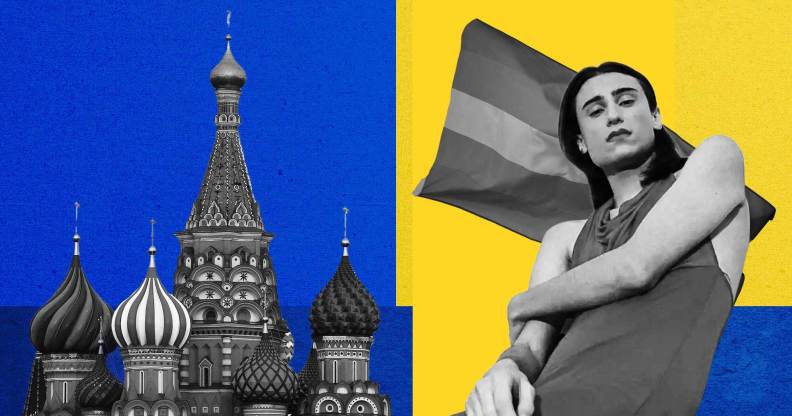Trans woman pushed to the brink in Russia amid fresh Putin crackdown: ‘I’m scared s**tless’

Mihelina moved to Moscow from Georgia. (Getty/miliyollie)
A trans woman living in Moscow is scared for her safety as Russia moves to ban gender recognition and trans healthcare.
Mihelina moved to Moscow from Georgia to study performative arts and music. It used to be “one of the most liberal cities and queer friendly,” she tells PinkNews, via translation by Queer Svit co-founder Anna-Maria Tesfaye.
“Now, every day, I hear slurs and threats towards me,” she goes on.
Since Russia’s invasion of Ukraine, president Vladimir Putin has clamped down even further on LGBTQ+ people in Russia. Trans people have been considered internal enemies, with fresh efforts to take away their rights to healthcare, legal recognition and participation in society.
“All of this made homophobes and transphobes feel more comfortable and basically made them think they can do anything,” Mihelina says.
“For example, two days ago, we were walking around in one of the central parks in Moscow, and two men came to us and said, ‘You have two minutes to leave this park or else’.
“Then, we went to the [underground], and someone called my friend a ginger c**t for no reason.”
Mihelina, who uses she/him pronouns, has been left “worried and scared s**tless”. She’s particularly concerned for his future given a new bill that seeks to ban trans people from updating their official gender marker, particularly with Russia tightening its conscription for the war effort.
She eventually made contact with Queer Svit, an LGBTQ+ support group which, among other things, is helping trans people to obtain legal recognition while they still can.

“Before Queer Svit happened, I thought that the only option I had was suicide… I was very confused, and I didn’t know what I should do” Mihelina says.
“Every day, a new law project or law would be passed. It’s not only concerning queer people, but in general. They were all insane… I felt absolutely hopeless and I didn’t know what to do.
“But then I found that Queer Svit has this initiative where they help people like me with changing their gender marker.
“Honestly, when they said they would help me, it made me cry because I was unable to find money then, and my parents were not very helpful. They didn’t want to help me with this, and I was terrified.”
Russia moves to ban trans healthcare and gender recognition
On 14 June, Russian lawmakers gave initial approval to a bill that would ban gender-affirming healthcare as well as changing one’s gender marker in official documents, such as passports, and public records.
The bill still needs to go through the state duma, the lower house of the Russian parliament, before it lands on Putin’s desk, but there’s little doubt that the legislation will pass quickly because about 400 of the 450 members of the Russian parliament, from all political factions, are listed as its authors, according to Russian independent media outlet Mediazona.
Queer Svit has received more than 500 requests from trans people like Mihelina who need help, Tesfaye says. The number has increased at least fivefold lately, because “people are freaking out”.
“Trans people are already marginalised,” Tesfaye says. “If – well not even if, it’s just when – they pass this law, it means these people will be unable to find a job, to get medical help, to have gender-affirming therapy and definitely surgeries. [It will] also increase the level of transphobia.
“This increases the level of any type of crime – hate crime, murders. I don’t think we can even process the levels of problems. It’s horrible.
“I don’t think I can even understand the catastrophe that will happen even though I know it will happen. It’s just impossible to realise how inhumane this law is.”
The anti-trans law is yet another blow to Russia’s beleaguered LGBTQ+ community
Putin, lawmakers and the Russian Orthodox Church have embarked on a decade-long campaign to preserve what they deem the country’s “traditional values.”
This crusade saw tightened restrictions under Putin’s so-called LGBTQ+ propaganda law, preventing queer representation in mass media.
The law, which was first introduced in 2013 under the guise of protecting children, was revised in December to prohibit the dissemination of information on LGBTQ+ and trans identities to people of all ages.
Amid this onslaught of state-run hate, LGBTQ+ activists have fled the country, queer organisations have been persecuted and social media influencers arrested.
The Russian health ministry has been instructed by Putin to establish a psychiatric facility to study the “social behaviour” of LGBTQ+ people, independent news outlet Meduza reported.

Health minister Mikhail Murashko announced the move while answering questions in the duma during the first reading of the bill.
LGBTQ+ groups fear the statements are a sign that Russia is preparing to roll out forcible conversion therapy. The pseudo-scientific practice has been widely condemned by medical organisations, LGBTQ+ advocates and human rights groups worldwide and has been compared to torture by UN experts.
Mihelina doesn’t have “any words to describe this madness”. She would “love to leave this country right now”, but she can’t because of family obligations and her studies.
She says music is what keeps her afloat – she’s “obsessed” with hyperpop, and artists such as Arca and Sophie.
Suicide is preventable. Readers who are affected by the issues raised in this story are encouraged to contact Samaritans on 116 123 (www.samaritans.org), or Mind on 0300 123 3393 (www.mind.org.uk). Readers in the US are encouraged to contact the National Suicide Prevention Line on 1-800-273-8255.
How did this story make you feel?

